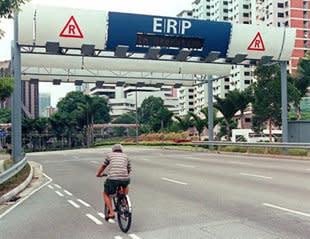Motorists raise concern over proposed new ERP system

The Land Transport Authority (LTA) is looking for new ways to implement the electronic road pricing (ERP) system without the physical infrastructure marked by the existing iconic -- and controversial -- blue-and-white gantries dotting Singapore, but a proposed approach is raising concern among motorists.
The LTA on Tuesday awarded tenders for trials to develop the next generation of the ERP system, which will embrace the global navigation satellite system (GNSS), a technology that makes use of satellites to determine the position of a vehicle.
The agency said that while the current gantry-based ERP system has served well, congestion will become more extensive and it may become impractical to continue installing ever more physical gantries to manage congestion.
Motorists responded to the news unfavourably. 35-year-old business manager Eddrick Tan slammed the new system, claiming that the traffic congestion problem will still persist.
He told Yahoo! Singapore: "It doesn't address the traffic congestion issue at all. The current system has highly visible gantries and the fees shown on the board could be seen at least a hundred metres away, giving sufficient time for motorists to think twice before driving through an ERP gantry. But the new satellite ERP system could create confusion among motorists because of its complex nature, thus undermining its effectiveness."
"Moreover, using satellite tracking intrudes one's privacy," he added.
ERP gantries have become a sore point for many Singaporean motorists who believe that the fees imposed and the wide coverage are excessive and do not curb congestion.
Taxi driver Ong Boon Keng said the new system could allow the government to collect more toll revenue.
"Without a physical gantry, some motorists might be 'tricked' into driving into an ERP-marked area," he said. "And I think that it's unfair to also include the fees that are calculated based on the distance clocked. We motorists might end up paying much more."
An expert Yahoo! Singapore spoke to revealed that the Global Positioning System (GPS) does not provide 100 percent reliable coverage, particularly in Singapore where cloud cover, trees, and high-rise buildings are ubiquitous. All these will affect the accuracy of satellite tracking, said Dave Ang, a technical engineer for Cisco Systems.
In a press statement, LTA added that the development of the project is in its very preliminary stages and that the next generation ERP system, if technically feasible, is still some years away before it is ready to be launched and implemented.
Under the tenders awarded, each party will be given seed funding of $1 million "to design, develop and demonstrate technological solutions" for the new system. This includes on-road testing and may involve the installation of roadside equipment in order to facilitate testing.
In addition to charging motorists only according to where they go, the improved system could also take into consideration the distances they clock.
The four companies selected by LTA are Kapsch TrafficCom; MHI Engine System Asia & NCS; ST Electronics (Info-Comm Systems) & IBM Singapore; and Watchdata Technologies & Beijing Watchdata System.
The trial starts in June this year and will last for 18 months.
According to the LTA, Singapore is not the pioneer country in the world to explore satellite navigation technology to curb road congestion.
In January 2005, Germany introduced a road toll system on its 12,100 km expressway network for all trucks with a weight of 12 tonnes and above. The toll is calculated according to the actual distance travelled by the trucks on the autobahn, number of axles and the emission category. The system employs a combination of mobile communications technology (GSM) and GNSS for automatic road toll collection. The modes of payment for the toll charges include both pre-payment and monthly billing.

